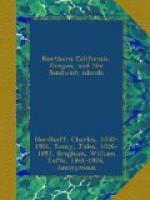[Illustration: POINT ARENA LIGHT-HOUSE.]
Seeing all this, I advise no new settler in the State to make wine. He runs too many risks with children and laborers, even if he himself escapes.
In giving this advice, I do not mean to be offensive to the great body of wine growers in California, which numbers in its list a great many able, careful, and sober men, who are doing, as they have done, much and worthily for the prosperity of the State and for the production of good wine, and whose skill and enterprise are honorable to them. But the best and most thoughtful of these men will bear me out when I say that wine growing and making is a business requiring eminent skill and great practical good sense, and that not every one who comes to California with means enough to plant a vineyard ought to enter this business or can in the long run do so safely or profitably.
Fortunately, no one need make wine, though every man may raise grapes; for it is now a fact, established by sufficient and practical trial, that raisins, equal in every respect to the best Malaga, can be made in California from the proper varieties of grapes, and can be sold for a price which will very handsomely pay the maker, and with a much smaller investment of capital and less skill than are required to establish a wine-cellar and make wine. The vineyard owners already complain that they can not always readily sell their crude wine at a paying price; but the market for carefully-made raisins is, as I am told by the principal fruit dealers in San Francisco, open and eager. To make wine requires uncommon skill and care, and to keep it so that age shall give it that merit which commands a really good price demands considerable capital in the necessary outlay for casks. While the skillful wine-maker undoubtedly gets a large profit on his vines, it begins to be seen here that there is an oversupply of poorly-made wine.
But any industrious person who has the right kind of grapes can make raisins; and raisin-making, which in 1871 had still a very uncertain future in this State, may now safely be called one of the established and most promising industries here.
In 1872 I ate excellent raisins in Los Angeles, and tolerable ones in Visalia; but they sell very commonly in the shops what they call “dried grapes,” which are not raisins at all, but damp, sticky, disagreeable things, not good even in puddings. This year, however, I have seen in several places good native raisins; and the head of the largest fruit-importing house in San Francisco told me that one raisin-maker last fall sold the whole of his crop there at $2 per box of twenty-five pounds, Malagas of the same quality bringing at the same time but $2.37-1/2. There is a market for all well-made raisins that can be produced in the State, he said, and they are preferred to the foreign product.
At Folsom, Mr. Bugby told me he had made last year 1700 boxes of raisins, and he was satisfied with the pecuniary return; and I judge from the testimony of different persons that at seven cents per pound raisins will pay the farmer very well. The Malaga and the White Muscat are the grapes which appear here to make the best raisins. Nobody has yet tried the Seedless Sultana, which, however, bears well here, and would make, I should think, an excellent cooking raisin.




